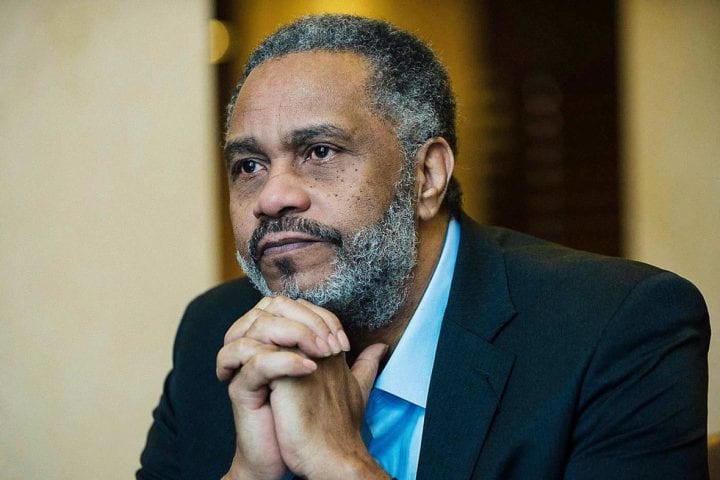
Anthony Ray Hinton’s Thirty Years on Death Row
May 2, 2019
“I would love to say that the state of Alabama made an honest mistake,” Anthony Ray Hinton began, addressing a packed house at Seattle First Baptist Church on April 30. “I wish I could look you in the eye and tell you that class and race had nothing to do with me spending thirty years in a 5×7′ cell. But the truth is, the state of Alabama did not make an honest mistake. The truth is, the prosecutor knew from day one that I was not the person who had committed those crimes… How does one survive?”
As part of SAL’s Hinge Series, Mr. Hinton recounted the harrowing journey in his memoir, The Sun Does Shine, about the thirty years he was held on Jefferson County Jail’s death row for a crime he did not commit, before finally being freed in 2015 with the help of Bryan Stevenson and the Equal Justice Initiative.
Youth Poet Laureate cohort member Da’Sund Fiir Heller wrote a poem specifically for Mr. Hinton’s event called “Shadow of the Mississippi,” which opened the evening—read it and listen to it performed here. As for the impact of the lecture, SAL Patron Services Manager Christina Gould, who introduced Mr. Hinton, said it well: “As I listened to his story of injustice, I felt rage, shame and an immense sadness. And yet, I found myself smiling and laughing. He is a man with a sense of humor, love in his heart, and a twinkle in his eye.”
For just a few of Mr. Hinton’s powerful words from the evening, read on:
On relying on his imagination to survive his incarceration: “As I sit there on this bunk bed that’s too small for me, I begin to tell my body: ‘Body, in order for me to survive, I must leave. I cannot leave physically, therefore I must leave mentally.’ And it was as if my body looked and me and said, ‘Do you promise to come back?’ And I said, ‘I have to come back. I have this case that I have to deal with at some point.’ The moment my body gave me permission to leave, in my mind, I left. Of all the places in the world to go, all the people that I wanted to see, for whatever reason, I wanted to meet the Queen… During Q&A, don’t nobody ask me why a twenty-nine-year-old Black man wanted to go see Queen Elizabeth, I don’t know!”
On not wanting to accept life without parole as a plea bargain: “I was twelve when my mother told me that if I was man enough to bend down and pick up a rock, and if I was man enough to throw that rock, then I should be man enough to say I had thrown that rock. I said, ‘This is one rock I cannot throw.’ So, if the state of Alabama is hellbent on executing me for a crime they know I didn’t commit, so be it. I would prefer to die then to stand up and say I did something when I didn’t.”
On the death penalty and Washington State: “Alabama was going to execute me in your name, in the citizens’ names of the United States, and that means Seattle as well. The state of Alabama was seeking to hide justice in the land, which was my life. And now I come to Seattle to ask you one question. Since the state of Alabama was going to execute me in your name, in the name of justice, I come here to ask you: where is my justice?”
On speaking to Bryan Stevenson about hiring a ballistics expert: “I said, Mr. Stevenson, I need you to hire a white man. And I need this white man to be from the south. I need this white man to be the best of the best. I need this white man to believe in the death penalty. But above all of that, I need this white man to tell the truth. Here I am on death row, fighting for my life, and I still have to worry about the race a man has to be to help me.”
On a broken justice system: “Thirty four years later, no one in the state of Alabama has had the decency to say, Mr. Hinton, we’re sorry. No one in the state of Alabama has said, ‘Mr. Hinton, what can we try to do to make you whole again?’ This is a system that we all embrace. This is a system that we embrace as long as it doesn’t come into my neighborhood… The system would have you believe that justice is blind. But justice is not blind. For she has a map. And on that map, she can see what race you are, she knows what gender you are, whether you went to college. She knows exactly how much money you have in the bank.”
On befriending Henry Francis Hayes, a KKK member who brutally lynched Michael Donald in 1981: “In this country, we say it takes a village to raise a child. I often wonder where that village was when Henry was being taught to hate… That village sentenced him to death, that village said this would be a better world without him in it… When they asked Henry if he had any final words [before his execution], he said: ‘All my life, my mother, my father, my community taught me to hate. The very people that they taught me to hate are the very people who showed me nothing but love. And tonight, as I leave this world, I leave this world knowing what love feels like.’ And they executed my friend Henry.”
On racism: “The only place that I have ever lived, the only place that I have ever visited, and never experienced racism, is on Death Row.”